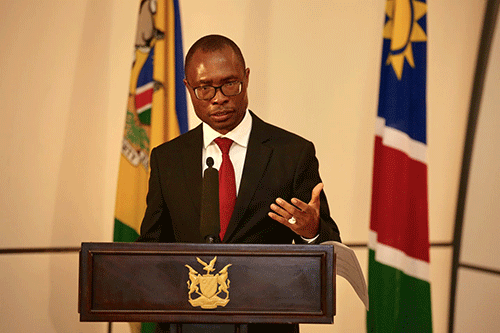The public debt stock is expected to increase to N$138.4 billion, equivalent to 69.6% of gross domestic product in FY2022/23. This shocking figure was shared by the finance minister Iipumbu Shiimi last week as he tabled a 2022/23 mid-term budget review in the National Assembly. According to a ministry official, Namibia’s current debt repayments are about N$1.5 billion every three months.
Over the medium-term, expenditure framework (MTEF) the pace of debt accumulation is projected to peak in the next financial year, resulting in a stabilisation of the debt ratios over the remainder of the MTEF, as nominal GDP growth outpaces debt growth.
“The high public debt levels continue to be central in the fiscal policy considerations over the medium-term. As affirmed in the previous budget, government maintains the commitment to redirect much of the revenue increases in the coming years, as the economy recovers, towards debt redemption and reducing the borrowing requirement as much as possible,” stated Shiimi.
He added government will focus on maintaining a positive primary budget balance over the medium-term.
At the same time, the finance minister noted government will continue working in close collaboration with the private sector to diversify the economy and create new engines of growth.
In his remarks, he stated for the previous financial year that ended in March 2022, the total debt stock stood at N$126.1 billion, equivalent to 66.9% of GDP. And at the half-year mark, the total debt stock stood at N$136.2 billion, equivalent to 69% of GDP.
“Debt servicing costs continue to trend above our desired benchmark of 10% of revenues. This adds further impetus to the call to stabilise the pace of debt accumulation, going forward,” said Shiimi.
Furthermore, on Thursday, deputy finance minister Maureen Hinda-Mbuende said going forward, government has devised a debt repayment strategy, which outlines measures to be undertaken in preparation of the repayment of central government debt.
“The strategy aims to ensure prudent credit risk management to avoid default events and make sure that the future generation is not over burdened with unsustainable debt,” she explained.
According to economic
analysts, elevated public debt remains a primary concern in the medium-term for the country.
Local economist Omu Kakujaha-Matundu noted that debt should be approved by the National Assembly to introduce transparency in public borrowing. Moreover, foreign borrowing has huge economic, social and political ramifications.
An economist from stock brokerage Simonis Storm, Theo Klein warned: “If debt continues to rise, and it’s being used mainly for consumption purposes, it will have serious negative long-term effects on our economy and for future generations because future generations will inherit a great amount of debt, which they will need to repay with tax revenue.”


